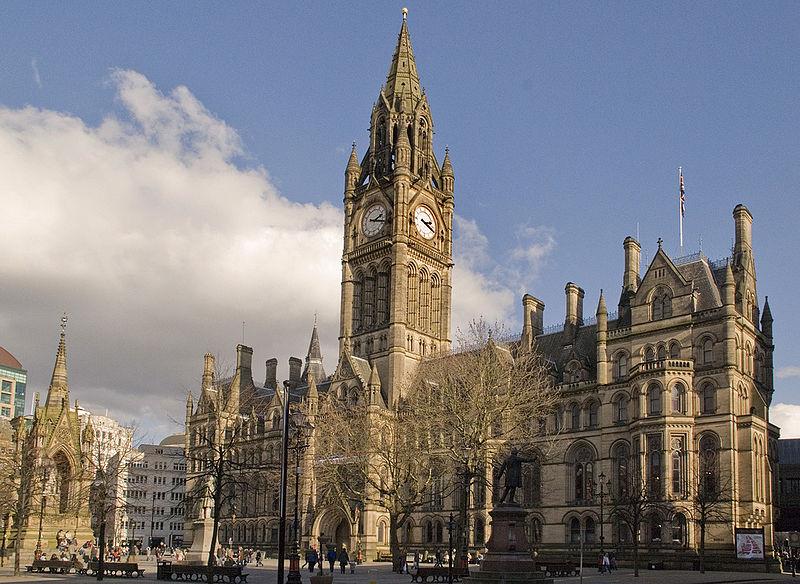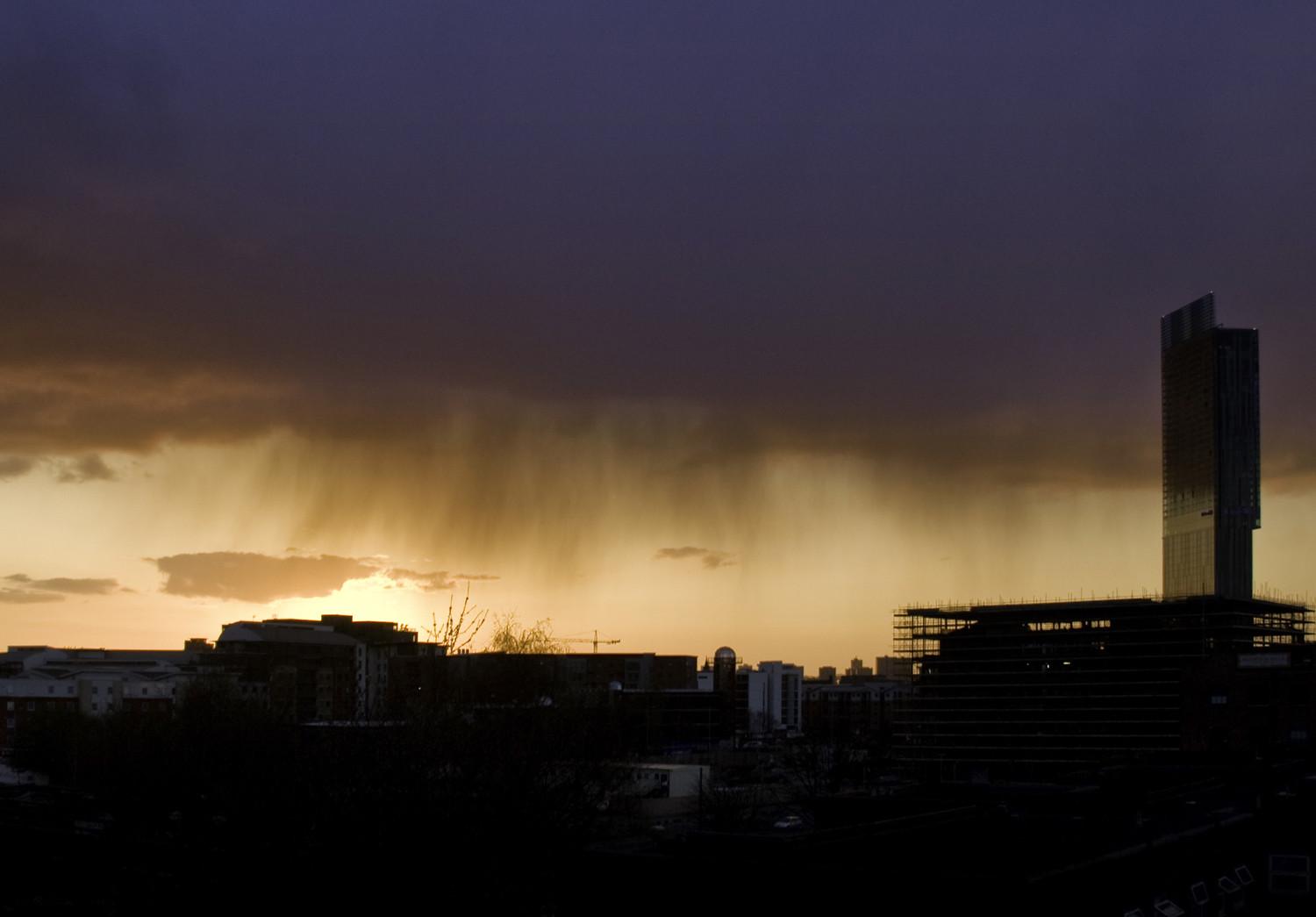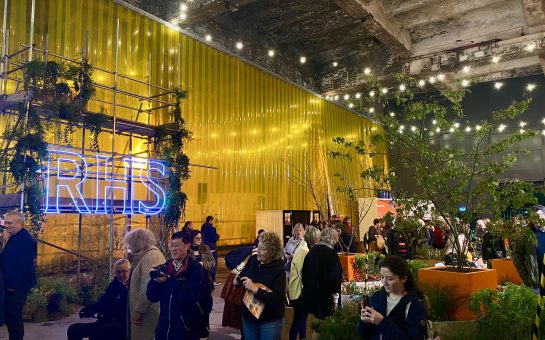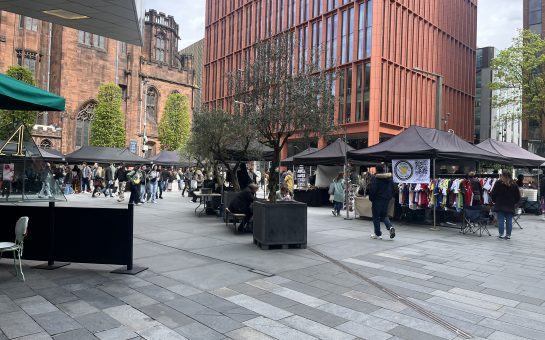Since December, Manchester City Council has made clearer than ever its intentions to establish the city as a UK leader on tackling carbon emissions.
Most recently, city councillors unanimously agreed to investigate how a London-esque Ultra Low Emissions Zone could be implemented in the city centre. Meanwhile, councillors are due to consider a report later this March which will set out how to halve the city’s current levels of direct emissions by 2025.
But the big one is that the city aims to become zero-carbon by 2038: a plan which has been in the works for a while.
On 16th December the council released further details of its climate action plan to become zero-carbon by 2038, noting that some 60 organisations – which collectively contribute about 20% of the city’s carbon emissions – have joined the Manchester Climate Change Partnership.
The aim of the partnership is to reduce the carbon emitted by the companies involved. It is advised by the Manchester Climate Change Agency, which helps the city to set the right eco-targets based on scientific advice.
The council – which itself contributes to about 2% of Manchester’s climate emissions – has also done its part over the years, claiming to have halved its emissions between 2009/10 and 2018/19, in addition to a street lighting replacement programme and the installation of a new Civic Quarter Heat Network.
But with Manchester’s current 2038 goal 12 years ahead of the UK’s national target, how likely is it that it will be met? And what changes will this city’s residents, workers, and visitors see as the date approaches?

Spending the budget
We met with Jonny Sadler, Programme Director for the Manchester Climate Change Agency, at their offices on Ducie Street to discuss the plans. He was keen to explain that the 2038 goal is not an arbitrary date, but one that’s been arrived at based on the city’s use of its ‘carbon budget’.
“We’re allowed to emit 15 million tonnes of CO2 between 2018 and 2100,” he said. “So if you think of it like a financial budget, it’s kind of up to you how you spend it; you could blow it all in the first weekend and then have nothing left for the rest of the month, or you could stretch it out a bit.”
According to Sadler, Manchester will burn through its budget in just 7 years at its current rate – hence the need to cut emissions urgently.
“The analogy we give is that it’s a bit like getting paid your salary on Monday 1st of the Month, and then spending it all by 2 o’clock on Wednesday of the first week. That’s how quickly were spending our carbon budget.”
All this is arrived at thanks to research conducted by the Tyndall Centre, a climate change research body spread across various universities including Manchester University.
Chris Jones, a Research Associate at the centre, explains some of the crucial changes that need to be made in order to reach the 2038 goal. “Reducing overall energy use probably has to be the first thing that happens, and then switching the mode for where the energy is sourced away from fossil fuels – natural gas in houses, and petrol and diesel in cars.
“Manchester’s got a lot of potential to increase how much electricity it generates from PV [photo-voltaic, or solar power]…“ He indicates out of the office window. “…There’s a tonne of available roof space fairly underutilised within the city.”
But this is easier said than done – especially with a central government that isn’t necessarily as ambitious as Manchester is. “Until recently, for businesses to put solar panels on their roof, particularly if they had a good landlord/tenant relationship, it’s a bit of a no-brainer.
“But a couple of years ago they introduced, essentially, a punitive tax on businesses having solar panels, so your business rates would go up.”
He notes that with further devolution from Westminster to local authorities such as Manchester, the city would be able to waive such restrictions.

Winds of change
So what next? For Sadler, getting the organisations that contribute the remaining 80% of the city’s carbon emissions on board would be a good start.
“The [companies] we’ve got are the ones that have got some of the biggest carbon footprints,” he explained, admitting that there were still ‘significant gaps’. “Universities, hospitals etc., they’ve got big carbon footprints. So I think we’ve got the main contributors in terms of a single organisation or a single sector. There’ll be one or two that we’ve missed.”
The key, Sadler continues, is to use the influence of the companies that are already on board. “You’ve got schools and colleges engaged; okay, it’s five or six percent of the city’s emissions, but you’ve immediately then got access to the hundreds of thousands of students and teachers as well.”
Large institutions such as universities and hospitals tend to have the biggest carbon footprints, according to Salder, through necessary utilities such as lights and indoor heating – particularly in a building with 24/7 operations.
‘Indirect’ emissions are less black and white. Sadler explains that these are emissions that are ‘embedded’ in things like laptops. “So those laptops need to be produced somewhere in a factory… so there are carbon emissions associated with that laptop.”
Sadler explains that although these factories may be in China or Bangladesh, ‘we have a responsibility for those emissions because they’re being emitted in response to our demands and our consumption here.’
“Some of the research that’s out at the moment estimates that your indirect emissions will be roughly 60% higher than your direct stuff,” he notes, claiming that Manchester itself emits about 2 million tonnes a year of direct emissions so indirect emissions may be around 3.2 million.
Another urgent need to be addressed, and one that residents will notice, is a greener transport system. “We’re starting to see investment in walking and cycling routes that we haven’t had for – probably ever, actually – in the city. So we need to see things like that continuing and the rate at which we deliver those kind of infrastructure projects needs to increase.”
Re-regulation of the city’s buses might also be on the cards, to put Manchester in line with Transport for London and enable the Greater Manchester and the combined authority to decide how the buses work, and to serve a greater amount of people with profit not necessarily at the forefront.
The cost
Some of the companies that the Manchester Climate Change Agency works with estimate costs of between 50 and 100 million pounds to retrofit their buildings with eco-friendly tech, claims Sadler.
Some people kind of go, ‘that sounds too expensive, how on Earth could we possibly afford to do that?’ But we find a way to invest in lots of other things when there’s a business case,” he said. Identifying this business case, such as saving money on energy bills or creating new jobs, is a crucial step.
In any case, climate change will mean that the cost to all of us is likely to be greater than financial hits. Jones comments on the ‘point of no return’ – a period after which human-affected temperatures ‘unlock’ natural processes, such as releases of methane – which would cause runaway global heating out of our control.
“I suppose the truth is that every time we reach a temperature threshold it can have largely irreversible impacts. So the warming we’ve had to date, you have to have a massive amount of greenhouse gas removal from the atmosphere to undo that warming.
“And it would be the same for 1.5 degrees, for 2… beyond 3 maybe, even if we do start removing all greenhouse gases from the atmosphere as quick as we can, maybe we’re not in control then. But up until that point, there’s always something to play for.
“When we pass 1.5, which is very likely, that’ll be a terrible failure. But don’t give up at that point. I don’t like the idea of the point of no return.”
All in all, it’s an ambitious effort. But after hearing the facts, it seems to be a necessary one, and the council demonstrably agrees.
Greenpeace, in any case, are all for it, stating to MM: “Manchester’s plans sound serious. They’ve involved the right experts to get sensible advice, they understand that the best target date is ‘as soon as possible’, and they’re focussed on cutting emissions now, rather than just declaring a target and hoping someone else reaches it.
“There will be challenges ahead, but they seem to be taking the right approach and could be a model for other cities to follow.”
Images courtesy of United States National Park Service and Mark Andrew, with thanks.



